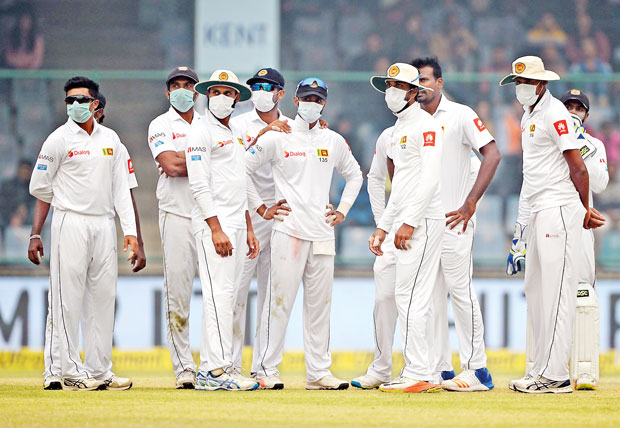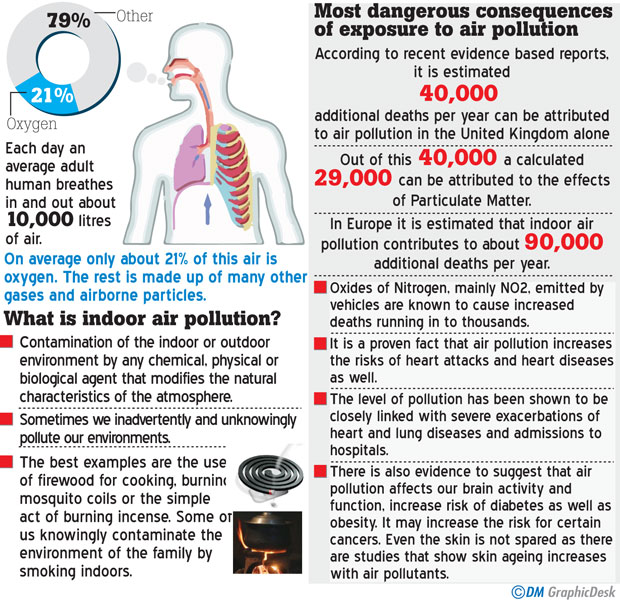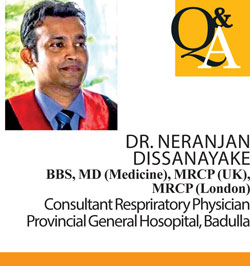Reply To:
Name - Reply Comment
Last Updated : 2024-04-18 07:50:00

 When Sri Lankan cricketers walked out of a Test match in Delhi wearing pollution masks, environmentalists were quick to point out that Colombo was not far from experiencing a similar issue. True enough for some of us prone to breathing problems, a brisk walk on the street is almost impossible without developing a coughing fit or itchy eyes. Air pollution isn’t always visible, but can certainly be deadly. As our exposure to emissions and poor air quality across Sri Lanka increases by the day, the quality of the air we breathe has now become a major public health concern. In a bid to enhance our understanding of air pollution and its effects, Health Capsule spoke to Consultant in Respiratory Medicine at the Provincial General Hospital and the District Chest Clinic, Badulla, Dr. Neranjan Dissanayake.
When Sri Lankan cricketers walked out of a Test match in Delhi wearing pollution masks, environmentalists were quick to point out that Colombo was not far from experiencing a similar issue. True enough for some of us prone to breathing problems, a brisk walk on the street is almost impossible without developing a coughing fit or itchy eyes. Air pollution isn’t always visible, but can certainly be deadly. As our exposure to emissions and poor air quality across Sri Lanka increases by the day, the quality of the air we breathe has now become a major public health concern. In a bid to enhance our understanding of air pollution and its effects, Health Capsule spoke to Consultant in Respiratory Medicine at the Provincial General Hospital and the District Chest Clinic, Badulla, Dr. Neranjan Dissanayake.
Excerpts of the interview:
QCan air pollution be defined in terms of medicine?
The life of every living being depends on the ability to produce energy for its day to day functions. Most of them use oxygen at the cell level to burn substances and produce energy efficiently. Humans depend on air around us to obtain oxygen through a mechanism we call ‘breathing’. Each day an average adult breathes in and out about 10,000 litres of air. On average only about 21% of this air is oxygen. The rest is made up of many other gases and
airborne particles.
In most instances these substances are quite harmless. But it is important to note that, whether or not a substance is harmful to the health of an individual will not only depend on the chemical and physical structure of that particular substance, but also the concentration of that substance in the atmosphere. It also depends on the time duration that an individual is exposed to that substance.Some substances, even in minute quantities,can cause significant harm while others may not.
The effects of certain inhaled substances will also depend on the health of the person who is exposed to it. Not all individuals will feel ill in this type of atmospheric environment.
The World Health Organization (WHO) defines air pollution as ‘contamination of the indoor or outdoor environment by any chemical, physical or biological agent that modifies the natural characteristics of the atmosphere’. Hence the presence of any gas, a particle or organism that is not usually present in the atmosphere is air pollution.

QWhat is indoor air pollution?
It’s important to highlight the significance of maintaining the atmosphere of our homes, dwellings and work places sans pollution. Sometimes we inadvertently and unknowingly pollute our environments. The best examples are the use of firewood for cooking, burning mosquito coils, burning incense or by smoking indoors.
QCan you define these harmful substances?
Some substances are gases such as ozone and oxides of nitrogen. Some are organic compounds that are easily vaporised at room temperature, hence they are called volatile organic compounds (VOC)(Eg: Benzene).
Particulate Matter or PM is one of the important groups of harmful substances that have been identified. PM is a complex mixture of extremely small particles and liquid droplets that enter the air. The diameter is usually measured in micro metres. Depending on size, not only can they reach air sacs and the distal airways of the lungs, but will penetrate and enter the lung tissue and body causing harm.
QHow can we measure air pollution?
How we measure this differs from country to country and area to area. Usually Governments and/or environmental agencies will identify certain defined substances and measure their concentrations in the atmosphere. Depending on that they will calculate an index which will be used to stratify the risks and warn the population in that specific area and during that time period. This index is usually known as the Air Quality Index.

For example the United Kingdom uses the concentration of five substances. In Sri Lanka, the National Building Research Organisation (NBRO), conducts monitoring of air quality by measuring the concentrations of two substances, namely Sulphur dioxide (SO2) and Nitrogen Oxides(NOx). These stations are documented to be based on several districts in Sri Lanka including Colombo, Kalutara, Galle, Gampaha, Kurunegala,Kandy, Rathnapura, Anuradhapura and Badulla.
QCan air pollution affect a person’s respiration?
Many substances that we breathe are first encountered by the respiratory system; hence the many detrimental effects caused. The respiratory system, in turn tries to eliminate these substances by filtering, but sometimes it is overwhelmed by the concentration as well.
Many effects of air pollution will be felt by individuals who already have lung diseases such as asthma and chronic airway diseases (COPD). These substances will act as irritants and may trigger a response in the airways. As a result the muscles around the airways will get constricted, and there will be increased amount of secretions causing a narrowing of the airways. This will some time cause chest tightness, laboured breathing and a musical sound to emanate from the chest, which we call ‘wheezing’. The irritation will trigger a cough as well. In exceptional circumstances certain substances in given concentrations might cause extensive damage to the lung.
QCan exposure to air pollution cause respiratory disease?
Yes. There is enough evidence to suggest that air pollution not only aggravates pre-existing respiratory diseases, but causes respiratory diseases. The effects span from conception to the day we die. It has been shown that air pollution affects the growth of the foetus, especially the development of the lung. This means that this particular child, when born has an already compromised lung. This state is seen when a pregnant mother is exposed to smoke. But there are pregnant mothers exposed to second hand smoke bio mass fuel.
It has also been proven that certain pollutants cause asthma as well and trigger severe attacks of asthma. Air pollutants are a known cause of Chronic Obstructive Airway Disease, a chronic lung disease with major consequences to patients. It also can cause diseases of the minute space between the air sac and the blood vessels of the lung, which is known as the interstitial space. This thin membranous space is very important in allowing the diffusion of oxygen from air in to the blood. Hence the alteration will impair the oxygenation process. This group of diseases are called ‘Interstitial Lung Diseases’. Especially exposure to airborne substances when involved in various occupations sans proper protection can predispose a person towards developing this chronic respiratory illness.
QWhat are the most dangerous consequences of exposure to air pollution?
According to recent evidence based reports, it is estimated that 40,000 additional deaths per year can be attributed to air pollution in the United Kingdom alone. Out of this 40,000 a calculated 29,000 can be attributed to the effects of Particulate Matter.
In Europe it is estimated that indoor air pollution contributes to about 90,000 additional deaths annually. Oxides of Nitrogen, mainly NO2, emitted by vehicles are known to cause increased deaths running into thousands.It is a proven fact that air pollution increases the risks of heart attacks and heart diseases as well. The level of pollution has been shown to be closely linked with severe exacerbations of heart and lung diseases.
There is also evidence to suggest that air pollution affects our brain activity and function, increases the risk of diabetes as well as obesity. It may increase the risk for certain cancers. Even the skin is not spared as there are studies that show skin ageing increases with air pollutants.
QDoes air pollution cancel out the effects of exercise outdoors?
Whether it cancels out the benefits is debatable. But it will definitely increase the risk of adverse effects when we exercise in a polluted environment. This should not deter individuals from exercise.
QWhat precautionary measures can adults and children take to avoid over exposure?
I think the most practical aspect to control exposure to air pollution is to keep our atmosphere at both home and work as clean as possible. It’s always better to avoid particle generating substances like firewood, incense, mosquito coils being burnt. It is imperative that people avoiding smoking indoors, especially in the presence of family and colleagues.
QWhat mechanisms can be implemented to improve air quality?
Vehicle emitting tests that have been implemented is a positive step in this direction. I am happy that monitoring of air quality by the NBRO is gradually developing.The gravity and effects of air pollution has to be understood first. There are various studies done by some exceptional scientists looking into the Sri Lankan picture. If we can formulate a structure involving the Government and professionals involved in research and manage clinical aspects of air pollution, we can identify the Sri Lankan situation properly and implement certain mechanisms to negate the negative outcomes. Having efficient monitoring facilities with daily and if possible hourly updates on air pollution levels in a certain area will be the standard we should be reaching for.
Monitoring vehicle emissions more closely and efficiently with stringent measures taken at the policy decision level regarding the vehicles that are imported is important. A good set of rules with sound legal backing will be needed to curtail factories polluting the air.
QWhat is your final message to our readers?
The risks of air pollution to health are real. It is not hypothetical. It has arrived at our doorstep! As a nation and as individuals, it is time that we rise up to the challenge to counteract the negative effects of air pollution.
Dr. Dissanayake is the incumbent Hon. Joint secretary of the Sri Lanka College of Pulmonologists and a member of the European Respiratory Society and the Asia Pacific Society for Respirology. He also serves as a member in the advisory board on Tuberculosis to the Ministry of Health.

Add comment
Comments will be edited (grammar, spelling and slang) and authorized at the discretion of Daily Mirror online. The website also has the right not to publish selected comments.
Reply To:
Name - Reply Comment
On March 26, a couple arriving from Thailand was arrested with 88 live animal
According to villagers from Naula-Moragolla out of 105 families 80 can afford
Is the situation in Sri Lanka so grim that locals harbour hope that they coul
A recent post on social media revealed that three purple-faced langurs near t